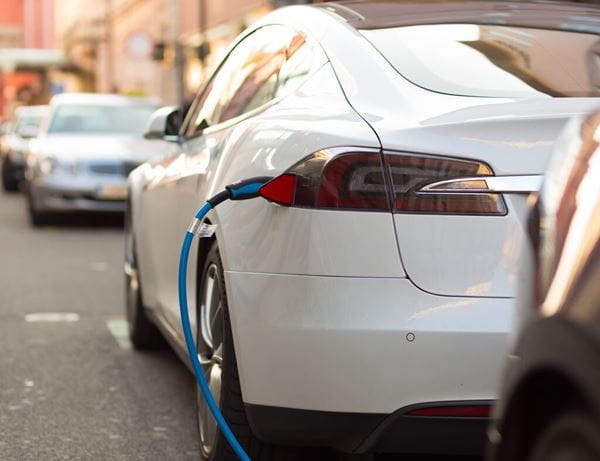
Could hydrogen fuel cells help us reach net zero CO2?
As global economies take steps to electrify and decarbonise transport, could hydrogen fuel cells provide a solution to some of the drawbacks of battery-electric vehicles?
The UK has set a target to become a net-zero carbon economy by 2050, and it’s a process that will change the way people and goods travel. Road transport was responsible for over a fifth of our total CO2 emissions in 2022, so finding alternatives to fossil fuels is an important step towards that end goal.
However, opinions differ when it comes to which solutions will get us there, with battery and hydrogen fuel cell electric vehicles often cited as key contenders. We’ve unpicked the pros and cons of each technology below.
What is a hydrogen fuel cell vehicle?
Put simply, it’s an electric vehicle that can produce its own electricity, instead of storing it in a battery pack. Fuel cells use a chemical reaction between oxygen from the air and hydrogen from a tank on board, generating electricity which can be used to power an electric motor. The only exhaust emission is pure water vapour and, as long as the hydrogen is electrolysed using renewable electricity (known as ‘green hydrogen’), then it’s a carbon-neutral power source.
This isn’t new technology. Hydrogen fuel cells powered NASA’s Apollo missions (and produced water for astronauts) during the 1960s, while General Motors repurposed the same hardware in the Electrovan prototype in 1966. Decades of research since have resulted in much smaller and more powerful fuel cell systems, while other drivetrain components (such as motors, power electronics and batteries) can be shared with electric vehicles.
How do hydrogen fuel cells compare to batteries?
Some of the benefits are shared. Both offer almost-silent driving and require less maintenance than a combustion engine vehicle, but there are some key differences.
A hydrogen fuel cell vehicle has several advantages:
- Range: A full tank of hydrogen provides a range of 400 miles, which is something only a handful of the longest-range electric vehicles can match.
- Refuelling: Similar to filling up with petrol or diesel, it takes less than five minutes to refuel a hydrogen tank. The fastest-charging EVs get around 62 miles in that time.
- Weight: Fuel cells reduce the weight and payload compromises of large battery packs. That’s particularly important for commercial vehicles.
- Materials: Alternatives are coming but batteries usually contain large quantities of hard-to-source materials, such as cobalt. Fuel cell vehicles have a smaller battery, used for storing excess energy and providing peak power for overtaking.
- Demand: Hydrogen can be electrolysed using excess energy from the grid, which means it’s easier to control demand. Mass adoption of EVs requires smart chargers that intelligently delay top-ups to avoid spikes.
However, electric vehicles have benefits too:
- Choice: Most manufacturers now at least one electric vehicle, which means there’s a choice ranging from compact city cars to luxury SUVs and vans. There are only two fuel cell cars available, and the cheapest starts at £53,995 on the road.
- Infrastructure: UK H2 Mobility’s live map shows only seven hydrogen stations nationwide, five of which are for bus fleets. Electric vehicles have 53,000 public chargepoints, while lots of drivers have access to their own at home and work.
- Cost: Charged overnight on a tariff with discounted off-peak rates, an electric vehicle could cost just 2p per mile. A hydrogen fuel cell vehicle costs between 14p and 17p per mile – comparable with the most expensive rapid chargers, or a fuelled car.
- Supply: Almost half of the UK’s electricity came from renewable sources in 2022, according to National Grid ESO. Green hydrogen production is scarce – most is produced by reacting natural gas with steam, which is CO2-intensive.
- Efficiency: It’s more efficient to store electricity in a battery than it is using it to make hydrogen and then convert it back to electricity in a fuel cell. An electric vehicle can travel three times further than a fuel cell vehicle on the same amount of energy.
Which manufacturers are selling hydrogen fuel cell vehicles in the UK?
At the moment, only two manufacturers have hydrogen fuel cell vehicles available to buy. The second-generation Toyota Mirai saloon launched in 2021, while Hyundai has offered the Nexo SUV since 2018. Both have sold in small volumes – there are 213 hydrogen fuel cell vehicles on UK roads, according to the Department for Transport, and 84 of them are buses.
Most of the recent announcements are focused on commercial vehicles, particularly for large vans and trucks, where range and payload compromises make battery-electric vehicles more difficult.
- Renault formed a partnership in 2021 to offer a turnkey hydrogen solution for fleets, based on the Master van. There are three bodystyles available, with a range of up to 252 miles (62 from the mains-rechargeable battery) – that’s two and a half times further than the battery-electric Master, with almost no loss of payload.
- Stellantis has fuel cell versions of its mid-size Citroën Dispatch, Peugeot Expert and Vauxhall/Opel Vivaro vans. These have a 250-mile range, including 31 on battery power – that’s 50 more than the longest range electric models, while payload is unchanged. A hydrogen Movano van is also under development.
- Toyota will begin fleet trials of a hydrogen fuel cell Hilux pickup truck in 2024, developed in the UK. This shares components with the Mirai, offering a range of 365 miles and as-yet-unconfirmed high payload and towing capabilities.
Most truck manufacturers also include hydrogen fuel cells as part of their technology roadmap.
How is the UK supporting hydrogen?
The UK has home-grown expertise in hydrogen fuel cells. ITM Power is building electrolysers in Sheffield, while Johnson Matthey (which supplied components for the Apollo missions) has a vehicle-focused R&D centre here too. Government strategy is targeting 10GW of low-carbon hydrogen production by 2030, with half of that coming from electrolysers. However, the focus is industry, heating and heavy-duty and emergency services vehicles, while support for cars and vans is patchier.
Because hydrogen fuel cell vehicles don’t emit CO2 at the tailpipe, they qualify for some of the same incentives as electric vehicles – emissions from generating electricity or producing hydrogen are not counted. Benefit-in-Kind is currently 2% for company car drivers (0% for vans), there is no VED until April 2025, no fuel duty on hydrogen and they count towards the government’s Zero-Emission Vehicle Mandate which comes into effect in 2024.
However, suppliers have also highlighted issues with the Renewable Transport Fuels Obligation (RTFO), which mean it isn’t effectively incentivising production of hydrogen. This requires energy companies to produce a percentage of their fuels from renewables, with the option to buy and sell credits from others. Although hydrogen is included, it must be made with 100% renewable electricity which effectively requires on-site energy generation, as the grid hasn’t been decarbonised yet. This means producers can’t earn extra credits for making it, reducing their costs and enabling them to cut prices to end-users.

.jpg?rev=3adbd558867c4d92bf9f22752f12a09c&mw=600)

